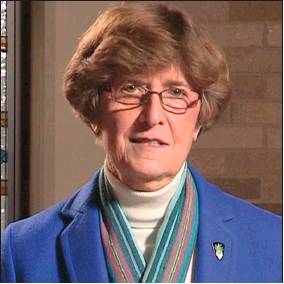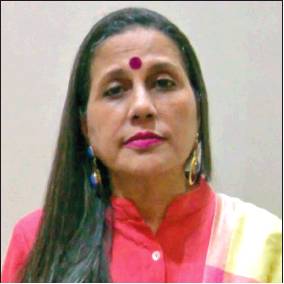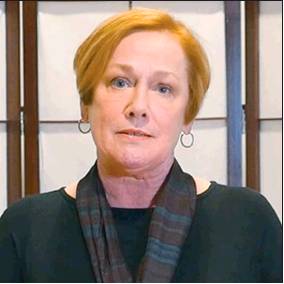Initiative elevates women’s voices
Catholic Women Preach project showcases women preachers via modern tech
BY SHIREEN KORKZAN SKORKZAN@NCRONLINE.ORG
Cynthia Bowns has felt the calling to be a deacon since her husband went through the diaconate formation program a few years ago. Despite the Catholic Church’s rule that women cannot be ordained, Bowns started preaching to members of her parish at Mass and whenever she is requested.
“There’s a great need for [preaching] from a woman’s perspective, especially married women,” she said.
Bowns said her preaching has been well-received among her fellow parishioners, and several of them even call her a deacon because of it.
Her time at the pulpit hasn’t gone unnoticed. A couple of years ago, Deborah Rose-Milavec, executive director of FutureChurch, an organization that advocates for women’s ordination and ending clerical celibacy, asked Bowns if she would be interested in participating in a new initiative dedicated to women preaching.
Today, Bowns is one of 34 women preachers who are part of Catholic Women Preach, a project dedicated to showcasing women preachers through modern technology, including internet-based resources.
The preachers consist of laywomen leaders from various backgrounds, including women religious, theologians and others who are active with their church and Catholic-affiliated organizations. All of them are volunteers. As of February 2015, according to Georgetown University’s Center for Applied Research in the Apostolate, there were more than 39,600 lay ecclesial ministers in the U.S.; 80 percent of them — about 31,680 — are women.
Each week, Catholic Women Preach posts a new video online of a woman preaching based on the week’s Scripture readings.
Dominican Sr. Mary Catherine Hilkert, theology professor at University of Notre Dame, said she has never felt a calling to become a deacon or a priest, but she believes parishioners can benefit from listening to preachers of different backgrounds, including gender.
“I don’t want to see all ministries of the word become clericalized,” Hilkert said. “But even when preaching in a parish there are people — children, elderly, widowed, divorced, newly married, teenagers and others that have to be there. You’ve got a range of ages, people dealing with recent deaths or tragedies, new baby, etc. All examples can’t specify each individual, but I think the pope’s message of the Gospel means knowing joy is not the same at every point in your life.”
Rose-Milavec said FutureChurch launched Catholic Women Preach to give women a bigger voice within their current roles in the church because they are often times “misrepresented” and “left out.” She also said the technological resources that Catholic Women Preach uses may also help people worldwide who are homebound in regions of world with no access to Mass or the Eucharist.
“[Catholic Women Preach] doesn’t replace [Mass], but it’s becoming a real part of their spiritual practice and helps them feel nourished spiritually,” she said.
Hilkert said that she films herself preaching in the chapel inside Notre Dame’s theology department. One of Hilkert’s students assisted her with filming her preaching for the third Sunday of Lent.
“Preaching into a camera is difficult because preaching is meant to be an interpersonal kind of communication,” Hilkert said. To make her preaching feel more natural, Hilkert said she preached directly to her student while filming.
Russell Petrus, program director of FutureChurch, emphasized that Catholic Women Preach strives to include women preachers of all backgrounds.
“There is a wonderful sense of diversity in this group, and we’ve really made a strong effort to put forward as many perspectives as possible,” he said. “That’s one thing missing in our church … women, African-American, Latino voices. … We wanted to make sure we are elevating all of those voices. It’s a core principle and value in Catholic Women Preach.”
Astrid Lobo Gajiwala, a full-time medical scientist in Mumbai, India, is active with her church and has preached numerous times on request. She said she joined the Catholic Women Preach initiative when she met Rose-Milavec at the Vatican’s International Women’s Day celebration in Rome in 2014, where Gajiwala was a panelist.
Gajiwala said she thinks women preaching can provide perspectives on faith in ways men cannot.
“I think women … because of our experiences of life as women … we have insights which would not be heard from priests with regard to family, personhood, how we experience God, how we pray,” she said. “I really wish we would see more women preaching because I think we have so much to offer the church, if only the church would listen.”
According to Rose-Milavec, more than 63,000 people have already visited Catholic Women Preach’s website since the project officially launched in November 2016, and the feedback has been mostly positive. Some priests have even used Catholic Women Preach’s website as a resource for their weekly homilies. Website data has also shown that women and men between ages 25-34 have been using Catholic Women Preach’s resources equally.
“This is beyond our imagination for the first year, let alone first six months,” Rose-Milavec said. “This is a great testament to these preachers.” [Shireen Korkzan is an NCR Bertelsen intern.]


